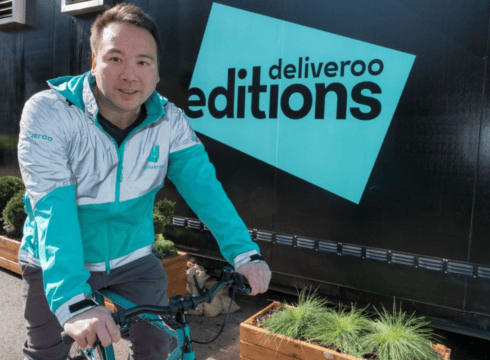Focused on developing our centre here but not focused on launching the business here: Deliveroo cofounder Will Shu
While quick commerce could work in certain areas, the model is not viable long-term: Shu
Grocery delivery and platform advertising have emerged as important revenue streams for Deliveroo: Shu
Inc42 Daily Brief
Stay Ahead With Daily News & Analysis on India’s Tech & Startup Economy
Will Shu, the cofounder of London-based food and grocery delivery major Deliveroo said that while India is an amazing market, the listed company is not planning an India launch yet. However, the company is looking to expand its India team size over the next few months.
For context, Deliveroo has a development centre in India, which it set up in late 2021. According to the Deliveroo cofounder, the company has 125 engineers and developers at the India centre and is looking to expand the team size in the coming months.
“I think it [India] is an amazing market. I wish that I could have gotten into India early, but that didn’t happen. Now you got two big players, two players I respect hugely. We are focused on developing our India Development Centre here but not focused on launching the actual business here,” said Shu in a conversation with CNBC-TV18.
Speaking on the global slowdown, Shu said, “I think what’s happening over the last few years in terms of COVID bump for a lot of tech companies and the growth from COVID tailwinds not persisting for as long as we thought.”
He said that Deliveroo has been hyper-focused on financial discipline. “We are taking this opportunity to rethink how we do things, get leaner and generate cash faster than we would have thought maybe a few years ago,” Shu added.
Deliveroo was founded by Shu and Greg Orlowski in 2013 and operates in the United Kingdom, France, Belgium, Ireland, Italy, Singapore, Hong Kong, the United Arab Emirates, Kuwait and Qatar. The company competes with the likes of Talabat, Just Eat and Uber Eats across the said geographies.
It is prudent to mention here that Deliveroo has also exited two markets – the Netherlands and Australia – owing to an adverse macroeconomic environment and increased competition.
If Deliveroo lands in India, it would directly compete with Swiggy and Zomato. In a market which has seen the likes of FoodPanda and Uber Eats fail, Deliveroo would have a steep challenge ahead of it. However, it could also bring a much-needed third player into a market which has become a duopoly over the last few years.
Parallels Between Deliveroo, Swiggy & Zomato
The listed startup had raised $1.53 Bn before its IPO in March 2021, months before Zomato made its market debut in July of that year. However, while Zomato’s food delivery business achieved adjusted EBITDA break-even in Q3 FY23, Deliveroo has yet to make a profit, stating that it would achieve break-even in 2023 or early 2024.
While talking about new revenue streams that food delivery startups have been looking for, Shu mentioned that grocery has emerged as one of the most important revenue streams. “Grocery is a huge part of our business now, much more than I thought it would be at the beginning of COVID,” Shu said.
He added that Deliveroo is working with local grocery brands while building dark stores of its own to deliver groceries in 15-30 minutes in key geographies. Shu also noted that advertisement has become a key revenue driver, with Deliveroo launching advertisements for restaurants and FMCG companies.
Incidentally, both Zomato and Swiggy have built their niches in grocery delivery. The former bought Blinkit for INR 4,447 Cr; the latter built its grocery vertical organically.
However, while Zomato has been burdened by the high cash burn of Blinkit, Swiggy’s Instamart has become an increasingly important vertical for Swiggy. According to Swiggy’s FY22 numbers, it earned INR 2,035.6 Cr from grocery delivery, 33.2% of its total revenue, which stood at INR 6,119.8 Cr in FY22.
Sharing thoughts on the 10-minute delivery, or quick commerce model, Shu said that while it could work in certain areas with a high population density and market share dominance, the model is not viable long-term.
{{#name}}{{name}}{{/name}}{{^name}}-{{/name}}
{{#description}}{{description}}...{{/description}}{{^description}}-{{/description}}
Note: We at Inc42 take our ethics very seriously. More information about it can be found here.


